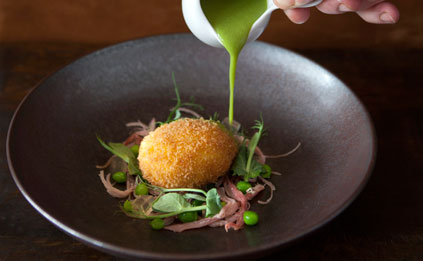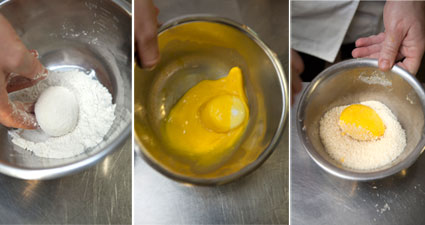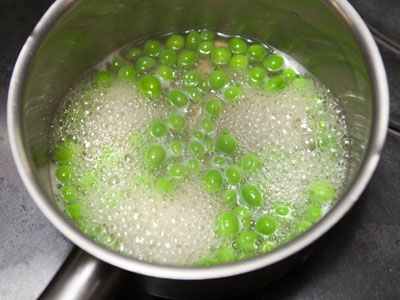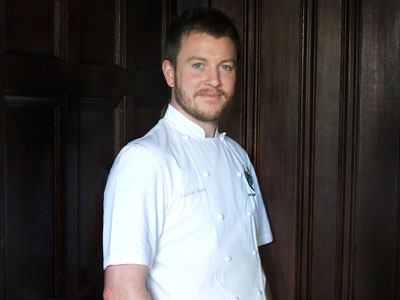Chef masterclass – eggs with Richard Davies
Too often seen as calling for little more culinary skill than a slice of toast, hens' eggs can offer rich rewards to chefs like Michelin-starred Richard Davies who are prepared to give this humblest of ingredients their full attention. Michael Raffael reports
Some ingredients are so basic it's easy to take them for granted. Whether free-range or battery, eggs flow through kitchens with ne'er a second glance. This isn't the full story, though. Most free-range eggs are possibly a notch up from those produced in hut and cage systems, but not all are. Only when chefs have the good fortune to work with the freshest eggs from small, well-managed flocks can they recognise their superiority.
In cities, access to this kind of quality isn't usually an option. In the countryside, though, it's relatively easy to source eggs that are not only from "happy hens" but are also distinctly better to eat.
Restaurants put quails' eggs on menus and have no qualms about selling them as a luxury food. Yet few chefs have the confidence to serve something as ordinary as a hen's egg and feature it.
The other side of the coin is that some of the basic skills associated with cooking eggs have been lost through neglect. The cooking of eggs is passed down the line as a routine chore for the breakfast cook.
For many years France's Apprentice of the Year competition challenged competitors to prepare scrambled eggs. If today's students still learn how to prepare them at college, it's most unlikely they'll be using the kind of eggs that Richard Davies at the Manor House in Castle Combe, Wiltshire, handles daily. The hotel keeps its own flock of chickens, and he puts egg dishes on his menu confident that even the most inexperienced diners will notice that they do taste better.
taste the difference
Cooking isn't an exact science, but it is possible to show clear differences between genuine free-range eggs from a small, extensively reared flock and standard commercial eggs.
Davies demonstrates this by baking two 15cm Victoria sandwich sponge cakes (115g caster sugar, 115g softened butter, two eggs, 115g self-raising flour), one using Manor House hens' eggs and the other using standard eggs.
The cake made with Manor House hens' eggs turned out 7cm high, was bright yellow in colour, had a soft and melting texture and a rich egg taste. By contrast, the cake made with standard eggs stood only 6cm high, was dull yellow in colour, had a crumblier texture and tasted mildly, although pleasantly, of egg.
FRESHNESS It's quite unusual for a kitchen at any level to receive an egg that isn't fresh enough to use. Most have a shelf life of a couple of weeks, if not more.
Freshness, though, is a relative term and, after an egg has been laid, it changes in appearance as it ages. It's possible to tell a perfect one.
Break the egg on to a plate. The yolk has a distinctive "half-apricot" rounded shape. It sits in the centre of the glassy albumen - the egg white. Over time, the yolk flattens and moves to one side. The white spreads.
From a practical point of view, it's possible to continue working with eggs that aren't spot-on for most routine recipes. However, if they are going to be noticed or they are the focus of a dish, even for something basic like boiled eggs - even with hard-boiled eggs - freshness matters.
The Poacher's tale
To poach eggs, Davies recommends using a technique he learnt while working as John Campbell's sous chef.
Whether you are poaching one or two eggs at a time or preparing a small batch of, say, a dozen, take the following steps.
Break each egg into a separate cup. It should be perfectly fresh.
Always boil plenty of water - say 1.5 litres per egg - in a steep-sided pan. Add one or two tablespoons of spirit vinegar for the above amount. The size of pan will vary, but the water should almost fill it.
Unless the egg is going to be served at once, keep a container of iced water to hand to prevent residual heat overcooking it.
METHOD Bring a pan of water with a little spirit vinegar to a rolling boil.
Set the timer for three minutes if the egg is a standard size or three-and-a-half minutes if it's large.
Pour the egg into the pan. The heat from the base of the pan causes the white to form around the yolk.
Move the pan to the side of the range or lower the heat so the water stops boiling.
When the timer pings take out the egg and either drain it on a clean J-Cloth if it's for immediate service or transfer it to a container of iced water.
Chilled poached eggs can be reheated - for example, for breakfast - by simmering them for two minutes and draining.
It's worth noting that if the egg is very fresh, it doesn't need any trimming, but keep a pair of kitchen scissors to hand in case the white has spread a little.
CRISP MANOR HOUSE HENS' EGGS, WITH PEA AND WILD GARLIC VELOUTE AND SMOKED PORK
Costing
The dish figures on a £30 including VAT lunch menu. It highlights the advantages that a country house hotel with its own land enjoys. The eggs come from the hotel's own flock. The meat comes from pigs reared on its estate. The peas and pea shoots are from the kitchen garden and the wild garlic is in a copse a minute's walk away from the kitchen door.
Davies says that if costs are spread across annual food sales of about £1.4m, he turns in a 72% GP.
Planning
Poach and coat the eggs ahead of service.
Make the velouté in advance.
Shred the smoked pork knuckle and reserve.
Cook the peas and spinach to order.
Fry the egg at the last moment before assembly.
Ingredients
(Serves one)
1 poached egg
Bowls of flour, beaten egg and panko crumbs for coating
30g shelled peas
30g baby spinach
Salt
Frying oil
50g shredded, smoked pork hock (see photo opposite)
Pea shoots
Tomato gel (see photo)
100ml hot pea and wild garlic velouté (see photo)
Method
To coat the egg, put it in the flour, shake well and ensure it is well dusted.
Transfer it to the bowl of egg and shake it till it's coated in egg.
Transfer the egg to the crumbs and coat it evenly.
Now coat it in egg again, followed by more crumbs. (You can prepare the egg to this stage and chill it ahead of service)
Blanch the peas and the spinach in salted water or a light stock. Drain when they are just tender. Squeeze excess moisture from the spinach.
Deep-fry the egg at 180°C till golden - about two minutes. Drain on absorbent paper or a J-Cloth, and season.
To assemble, make a small mound of spinach in the centre of the plate. Sprinkle peas and smoked pork around it. Lay the fried egg on the spinach. Finish with cubed tomato gel.
Serve the velouté separately in a small sauceboat and pour it around the peas and ham at the table.
Shredding, shelling and gelling
Pea and wild garlic veloute
Boil 500g of shelled peas in a litre of hock cooking liquor. Liquidise with 150-200g garlic, depending on its strength. Pass through a chinois, check the seasoning and, optionally, finish with a little butter.
Tomato gel Make a clear tomato juice: blend tomatoes to a pulp, empty them into a muslin jelly bag or similar and allow the juice to drip into a bowl overnight. Season the juice and heat 400ml with 12g vegetarian gel. Pour into a shallow tray to set, and cut cubes as needed.
Smoked pork hock
Soak pork hocks (the knuckles) in a brine (roughly 1kg salt to 10 litres water) for a week. Wash the knuckles and smoke them - duration depends on the temperature, but if you do it in a closed metal container on the range, it will take about 20 minutes. Poach for about two-and-a-half hours till tender. Cool, remove rind, pull the flesh off the bones and shred.
RICHARD DAVIES
As a boy growing up in the Welsh town of Bridgend, Richard Davies would take tomato sauce sandwiches to school in his lunch pack. "I was the worst eater ever," he recalls. "If you'd told my mother then that I was going to be a chef, she'd have laughed you out of the door."
Be that as it may, he was washing up dishes at the age of 14 (illegal now) and then spent three years as a commis working for Gordon Ramsay at Royal Hospital Road in London during the golden period when Ramsay won his third Michelin star.
Davies's next step up the ladder took him to the Vineyard, where he was John Campbell's sous chef.
Since 2006 he has been executive head chef at Exclusive Hotels' Manor House hotel on the edge of the Cotswolds. He won its Bybrook Restaurant three AA rosettes and a Michelin star and attracted national attention this year with a dish of strawberries and cream vanilla parfait, strawberry gel, panna cotta and ricotta dumplings that won Best Dessert in the BBC's Great British Menu Comic Relief extravaganza.













